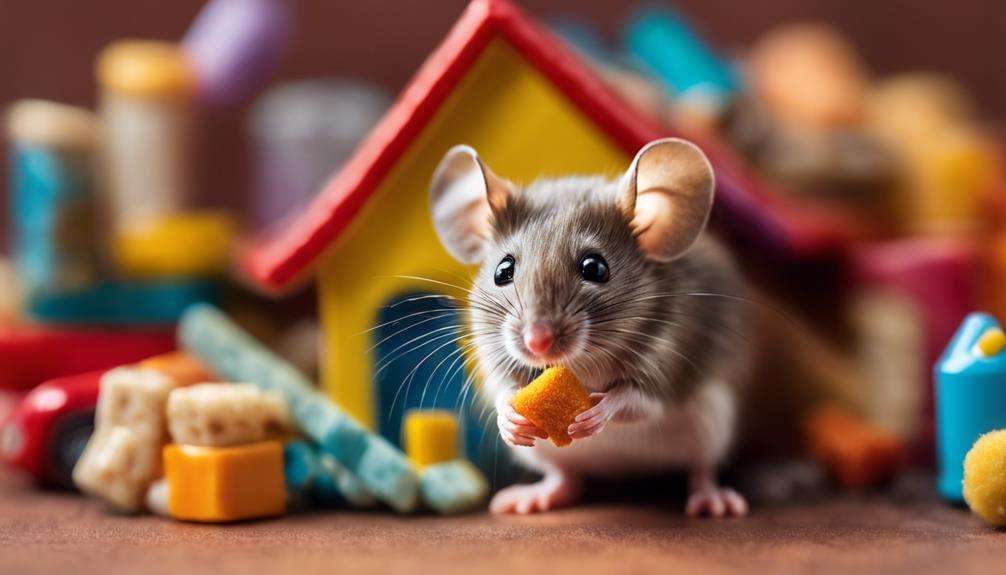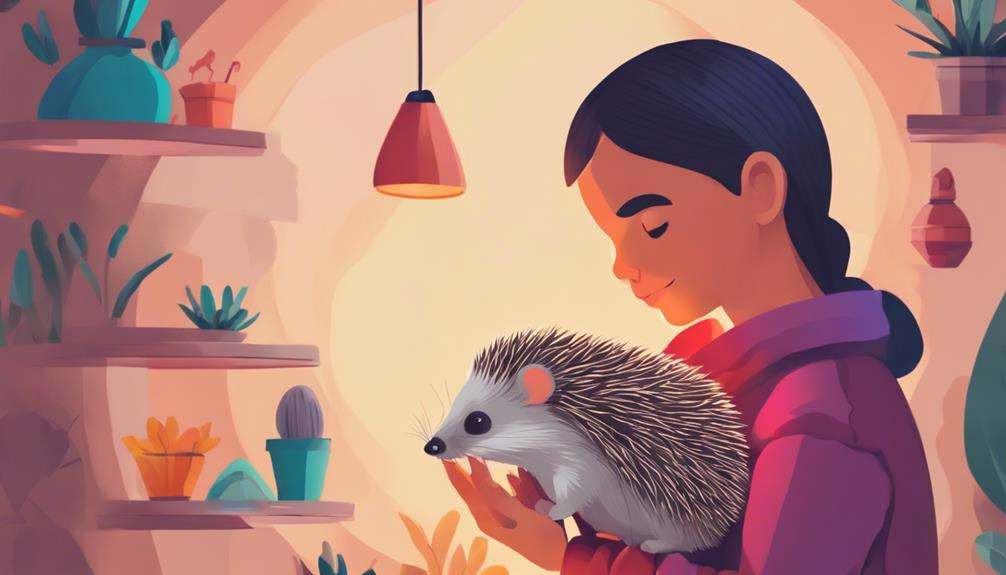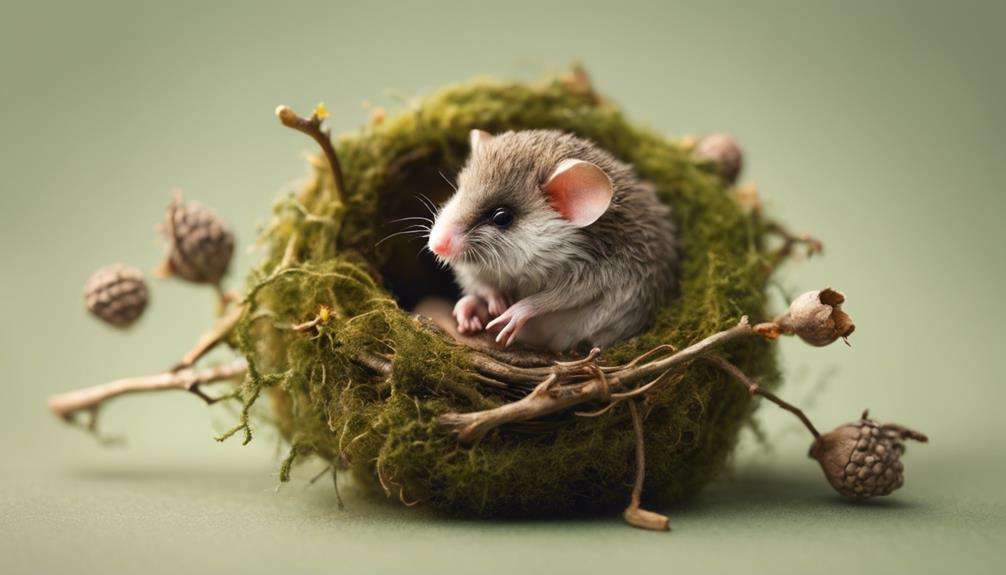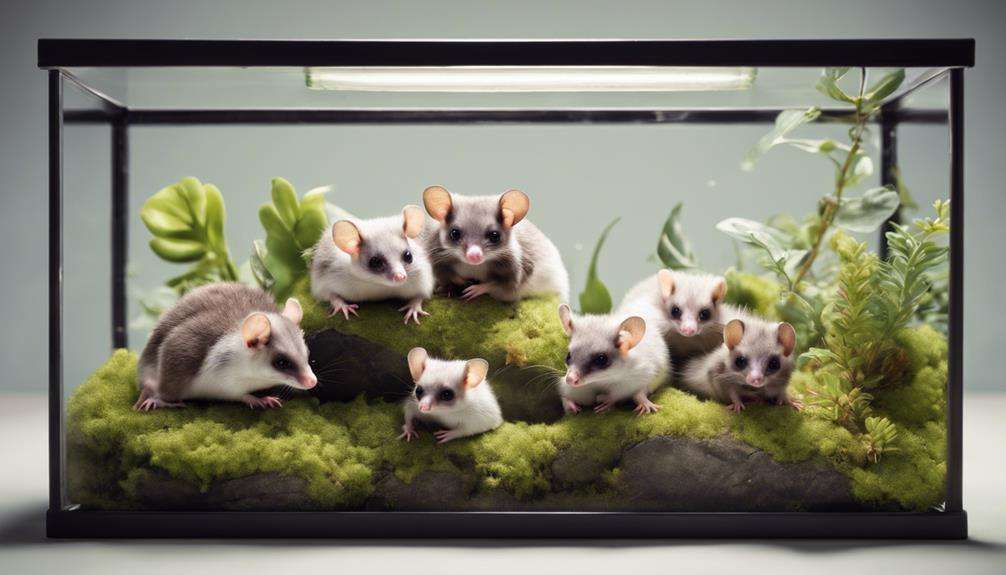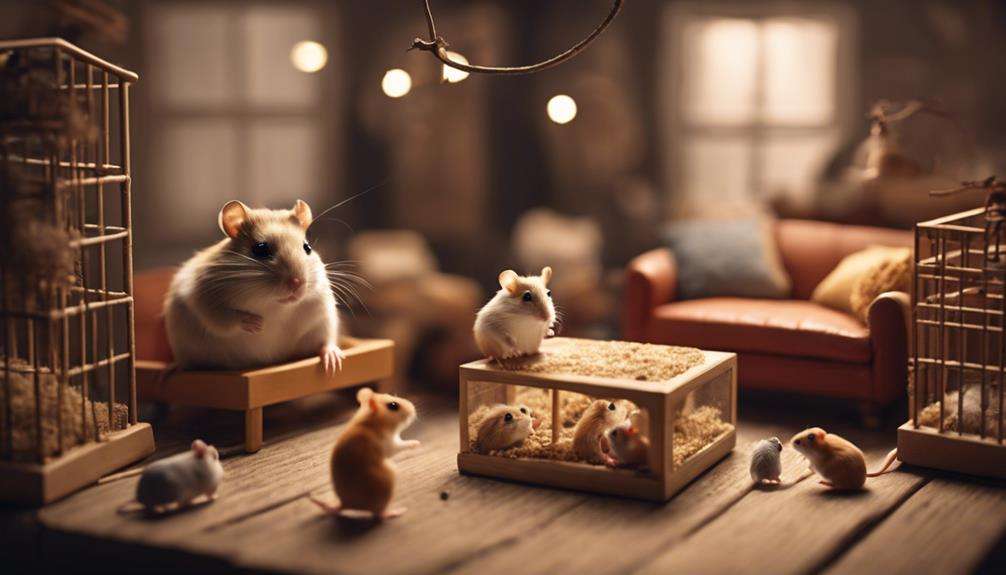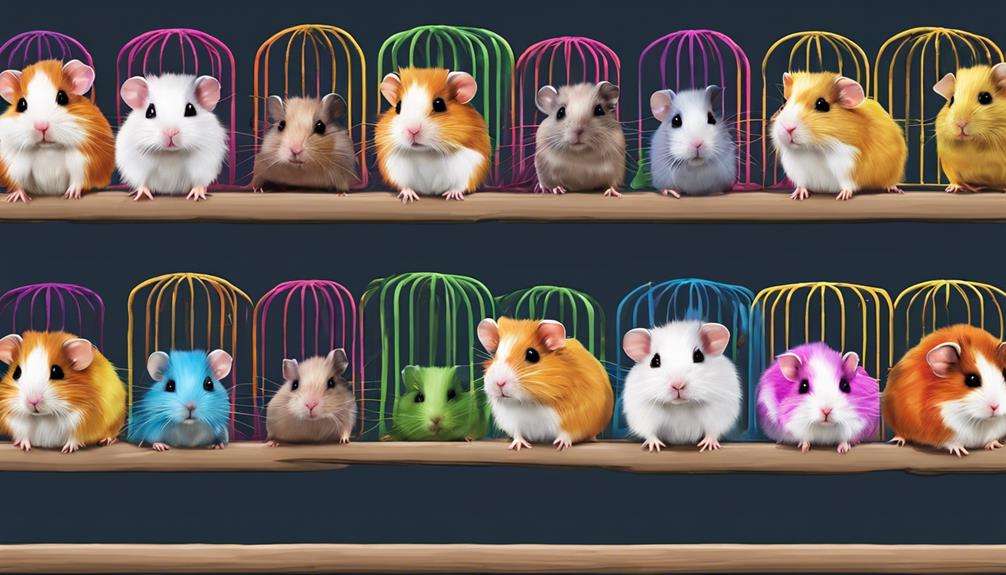Imagine stumbling upon a tiny creature that captivates your interest with its uniqueness. The world of unusual dwarf mammals as pets holds a certain allure, but what does it truly entail to care for these diminutive beings?
Understanding their specific needs and the responsibilities involved is just the tip of the iceberg when considering such a venture. The intricacies of providing a suitable environment and meeting their dietary requirements can be both challenging and rewarding.
But what other factors should you consider before venturing on this journey into the realm of exotic dwarf pets?
Key Takeaways
- Pygmy Hedgehogs and Jerboas have specific habitat needs and diets, requiring warm environments and nocturnal care.
- Sugar Gliders and Pygmy Possums from Australia need specialized diets, social interaction, and conservation attention.
- Small primates like Pygmy Marmosets and African Pygmy Dormice are highly social and require specific care for their well-being.
- Lesser Hedgehog Tenrecs exhibit uncommon behaviors, unique spines for echolocation, and require understanding of their social needs.
Pygmy Hedgehogs
Pygmy Hedgehogs make fascinating and unique pets, originating from Africa and reaching sizes of 5-8 inches in length. Their small size makes them ideal for indoor housing, requiring minimal space compared to larger pets. Despite their diminutive stature, these hedgehogs have big personalities. They're known for their curious and playful nature, often displaying amusing behaviors like running on wheels or burrowing in bedding.
Due to their small size, Pygmy Hedgehogs need specialized care to thrive. Providing a spacious enclosure with plenty of hiding spots is essential for their well-being. Ensuring a warm environment within the temperature range of 72-80F is vital, as they're sensitive to cold temperatures. Additionally, a diet high in protein and low in fat is necessary to maintain their health and longevity.
Sugar Gliders
Shifting from the enchanting universe of Pygmy Hedgehogs, let's now explore the intriguing domain of Sugar Gliders, tree-dwelling marsupials native to Australia and Indonesia. These small, nocturnal mammals are renowned for their unique gliding ability facilitated by a membrane known as the patagium.
Sugar gliders are highly social creatures, emphasizing the importance of companionship. It's recommended to keep them in same-sex pairs or small groups to prevent loneliness and stress. Their specialized diet consists of fruits, vegetables, proteins, and insects, necessitating a balanced nutritional intake for their well-being.
Communicative by nature, sugar gliders utilize various vocalizations like chirping, barking, and crabbing to interact within their group and with human caregivers. Playful and curious, these creatures thrive on mental and physical stimulation, requiring toys, climbing structures, and quality bonding time with their owners to make sure a fulfilling environment.
Jerboas
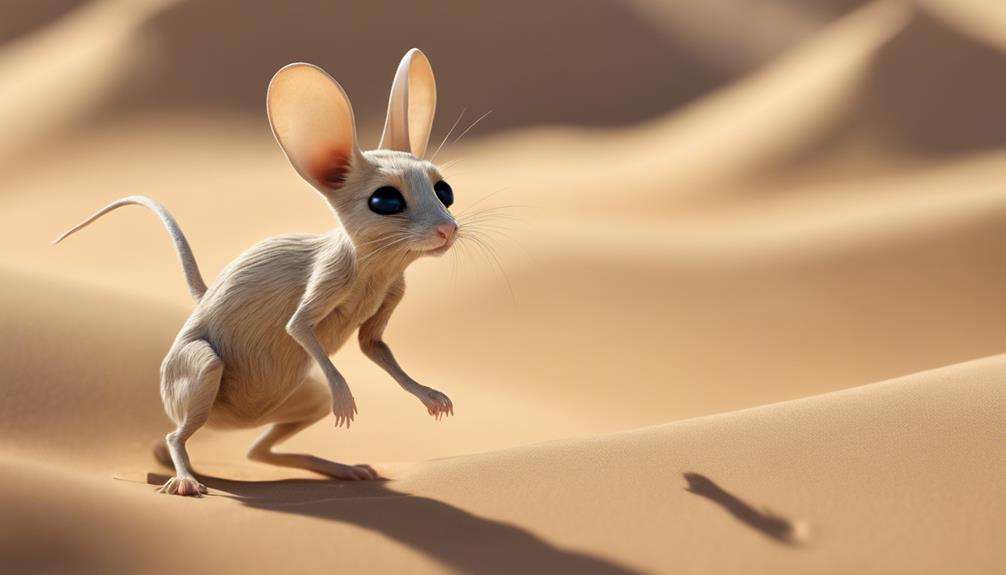
Jerboas have specific habitat needs due to their desert origins. They require a dry and sandy environment to thrive. Their diet essentials include primarily getting water from the food they consume to adapt to arid conditions.
Understanding their behavioral traits, such as communication through foot drumming and nocturnal activity, can help you provide the best care for these unique dwarf mammals.
Jerboa Habitat Needs
To create a suitable habitat for these small, bipedal rodents found in desert regions of North Africa and Asia, it's imperative to provide large, sandy enclosures with deep substrate for burrowing, hiding spots for resting during the day, and a varied diet of seeds, insects, and greens for utmost health maintenance. Jerboas, being small mammals, require these specific conditions to thrive.
Additionally, since they're nocturnal creatures, guarantee the enclosure is dimly lit during the day and provide opportunities for them to exercise during the night. Temperature regulation is crucial as they're sensitive to extreme heat or cold. By meeting these habitat needs, you can create a comfortable and stimulating environment for your pet jerboa.
Jerboa Diet Essentials
When considering the diet essentials for Jerboas, it's important to understand their omnivorous nature and specific nutritional requirements. Jerboas thrive on a varied diet that mimics their natural food sources. In captivity, make sure their diet includes high-quality hay, fresh vegetables, fruits, and occasional protein sources like mealworms.
These tiny mammals have high water requirements, so be sure they always have access to fresh water to stay hydrated. Monitoring their food intake is essential to prevent obesity and provide a balanced diet that meets all their nutritional needs.
To keep Jerboas engaged and stimulate their natural foraging behavior, offer a variety of food textures and flavors. Meeting their dietary needs is essential for their overall health and well-being.
Jerboa Behavioral Traits
With their unique adaptations to desert life, these small, bipedal rodents exhibit fascinating behavioral traits that contribute to their survival in harsh environments.
Jerboas, being small animals, are known for their solitary nature, preferring to live alone in burrows they dig in the sand. They're primarily nocturnal, avoiding the scorching heat of the day by being active during the cooler nights.
Communication among jerboas is intriguing; they use foot drumming and thumping to convey messages to one another. When threatened, these small creatures have a distinctive defense mechanism of releasing a foul-smelling substance to deter predators.
These behavioral characteristics showcase how jerboas have adapted to their desert habitats, allowing them to thrive in challenging conditions.
Pygmy Marmosets
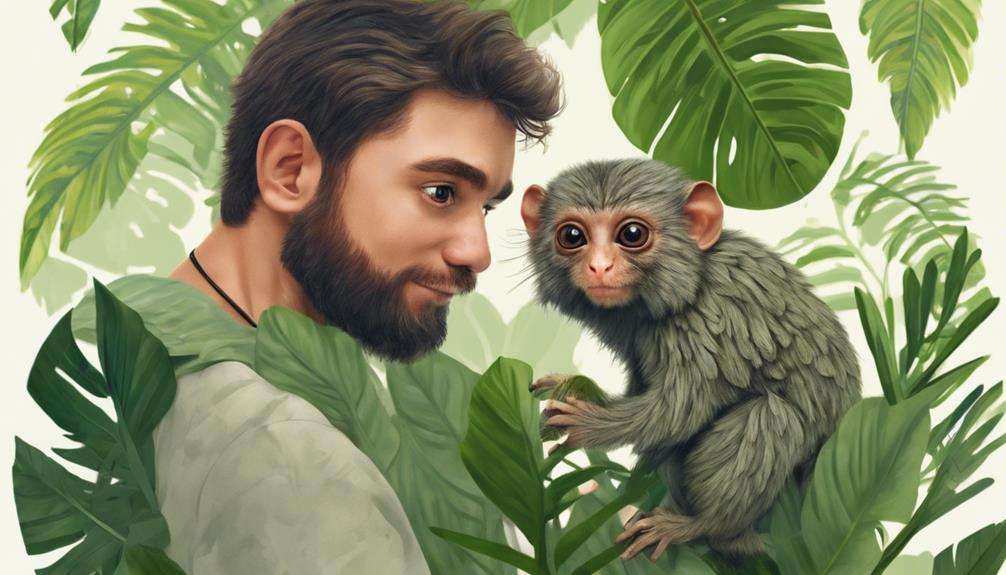
Among the fascinating array of unusual dwarf mammals that can make enchanting pets, the Pygmy Marmosets stand out as the world's smallest monkeys, measuring a mere 14-16cm in length. Originating from South America, these tiny primates are highly social animals, known for their intricate family dynamics. Pygmy marmosets have a diverse diet that includes tree sap, insects, fruits, and small animals found in the lush rainforest habitats they inhabit. Their unique physical adaptations, such as specialized claws for climbing and the ability to leap impressive distances between branches, make them well-suited for an arboreal lifestyle.
Communication plays a critical role in Pygmy Marmoset society, with vocalizations, body language, and scent marking being key elements in maintaining social bonds and establishing hierarchy within their groups. These intelligent creatures require mental stimulation and social interaction to thrive in captivity, making them more suitable for experienced exotic pet owners willing to provide the necessary care and enrichment. If properly cared for, Pygmy Marmosets can offer a fascinating glimpse into the intricate world of these miniature primates.
African Pygmy Dormice
African Pygmy Dormice make delightful pets due to their small size and charming demeanor. Understanding their care essentials, behavior, and habits is important for providing them with a suitable environment.
Learning about their omnivorous diet and nutritional needs will help you guarantee their well-being as beloved companions.
Dormouse Care Essentials
To guarantee the well-being of your African Pygmy Dormice, it's essential to provide them with a balanced diet consisting of insects, fruits, seeds, and vegetables, similar to guinea pigs. These small, nocturnal rodents require a varied diet to thrive in captivity.
Additionally, African Pygmy Dormice are social creatures and should be housed in same-sex pairs or small groups to prevent loneliness. Creating a suitable habitat with climbing structures, nesting boxes, and hiding spots is critical for their enrichment.
Regularly clean their living space to maintain hygiene, and make sure they've access to fresh water at all times. By meeting these care essentials, you can ensure a happy and healthy life for your African Pygmy Dormice.
Behavior and Habits
When observing the behavior and habits of African Pygmy Dormice, their nocturnal nature becomes evident as they're active during the night and rest during the day.
These small-framed creatures have a remarkable social nature, thriving when kept in same-sex pairs or small groups. Communication is key for them, using vocalizations, scent marking, and body language to establish hierarchy and bonds within their group.
African Pygmy Dormice have a lifespan of about 4 to 5 years in captivity, making them long-term companions. Their unique behaviors and habits make them intriguing pets to observe, especially during their active nighttime hours.
Understanding and accommodating their nocturnal lifestyle is essential for providing them with a comfortable and enriched environment.
Diet and Nutrition
Omnivorous by nature, African Pygmy Dormice require a varied diet rich in protein, fruits, vegetables, and insects for peak health. To meet their high metabolism needs, offer frequent small meals throughout the day.
Make sure a balanced nutrition intake by providing foods like mealworms, crickets, fruits, and leafy greens to supply essential nutrients. Prevent metabolic bone disease by including calcium supplementation, commonly administered through powdered supplements or cuttlebone.
Always have fresh water available, preferably in a shallow dish or a water bottle with a metal spout for easy access. By maintaining a diverse and nutritious diet, you can help your African Pygmy Dormice thrive and stay healthy.
Pygmy Goats
Standing at a height of 16 to 23 inches at the shoulder, pygmy goats are a small breed of domestic goat known for their friendly and sociable nature, making them popular as pets and companions. These pint-sized goats have a lifespan of around 10 to 15 years, necessitating proper care, nutrition, and shelter to thrive. Despite their small size, pygmy goats are intelligent and playful creatures that enjoy interaction with humans and other animals. They're relatively low-maintenance and adaptable to various climates, which makes them well-suited for small farms or backyard settings.
When considering a pygmy goat as a pet, make sure you provide a well-rounded diet, ample space for exercise, and regular veterinary check-ups to maintain their health and happiness. These small goats can bring joy and entertainment to your household with their curious and friendly demeanor. Remember that owning a pygmy goat is a long-term commitment, so be prepared to offer them a loving and caring environment throughout their lifespan.
Pygmy Possums
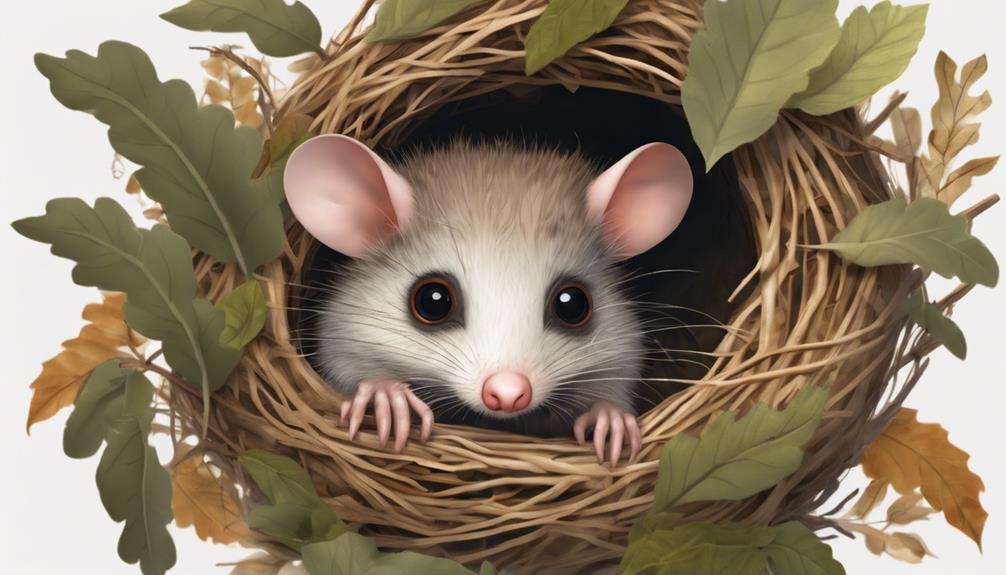
Pygmy Possums, unlike their larger goat counterparts, are tiny marsupials native to Australia, known for their diminutive size ranging between 5 to 12cm in length. These unique creatures possess the remarkable ability to enter torpor, a state of reduced metabolism, aiding them in conserving energy during challenging conditions. In their natural habitat of Australia, Pygmy Possums primarily sustain themselves by feeding on nectar, pollen, insects, and fruit. Their nocturnal nature is complemented by their prehensile tails, which they utilize for climbing and maintaining balance.
Conservation efforts play a critical role in the protection of Pygmy Possums, as they face threats like habitat loss and the adverse impacts of climate change on their populations. Given their specialized needs and vulnerability, it's essential to approach the care and keeping of these tiny marsupials with diligence and responsibility. By understanding and respecting their natural behaviors and requirements, one can provide a suitable environment should the opportunity arise to care for Pygmy Possums.
Lesser Hedgehog Tenrecs
Lesser Hedgehog Tenrecs, unique in their hedgehog-like appearance, are enthralling creatures worth considering as pets.
Their care requirements, including a diet rich in insects and a quiet, dimly lit habitat, make them intriguing companions for those seeking an exotic pet.
Understanding their distinctive features and needs is vital for providing these agile and speedy tenrecs with a suitable environment where they can thrive.
Unique Features
Possessing specialized spines capable of producing a unique form of echolocation, the tenrecs native to Madagascar exhibit remarkable features that set them apart from other small mammals.
These spiny creatures, resembling a blend of hedgehogs and shrews, rely on their vibrating spines to navigate in the dark forests of Madagascar. Lesser Hedgehog Tenrecs are insectivores, dining on a menu of beetles, worms, and larvae.
Their communication skills are equally fascinating, utilizing a range of vocalizations, clicks, and whistles to interact. What truly distinguishes them is their uncommon social behavior, living in small family groups in the wild, a rarity among mammals.
These distinctive traits make Lesser Hedgehog Tenrecs intriguing companions for those seeking unique pets.
Care Requirements
Developing a suitable habitat for your pet Lesser Hedgehog Tenrec involves creating a warm and humid environment with essential hiding spots for security and comfort. Native to Madagascar, these unique mammals thrive in temperatures between 75-85°F.
Provide a varied diet including insects, fruits, and small vertebrates to make sure their nutritional needs are met. Regular veterinary check-ups are important to monitor their health, as dental issues and obesity can arise in captivity.
Enrichment activities like tunnels, branches, and toys are beneficial for stimulating their natural behaviors and promoting overall well-being. Remember, creating a safe and enriching environment will help your Lesser Hedgehog Tenrec lead a happy and healthy life in your care.
Pygmy Rabbits
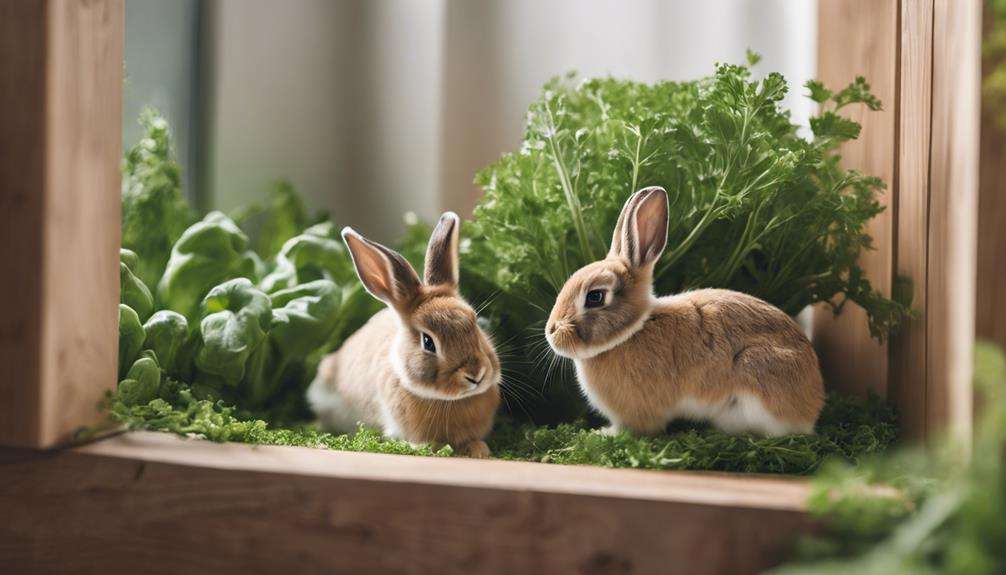
Pygmy rabbits, the smallest rabbit species in North America, are known for their distinctive features and habitat preferences in the Great Basin region of the United States. These tiny rabbits, scientifically named Brachylagus idahoensis, have a unique grayish-brown fur color, short ears, and a round body shape that help them adapt to their sagebrush habitat. They primarily inhabit areas in Idaho, Nevada, Oregon, and parts of California and Montana.
Unfortunately, pygmy rabbits face significant challenges due to habitat loss and fragmentation. As their sagebrush habitats are destroyed or altered by human activities like development and wildfires, these rabbits are increasingly at risk. Their herbivorous diet consists mainly of sagebrush, grasses, and other vegetation, sustaining them in the wild.
Given their conservation status, it's essential to understand the specific needs of pygmy rabbits before considering them as pets. Their elusive nature and burrowing behavior make them fascinating creatures to observe, but responsible ownership and a deep understanding of their requirements are essential to make their well-being.
Dwarf Mongolian Gerbils
With their compact size and social nature, Dwarf Mongolian gerbils make delightful and engaging pets for those seeking a small animal companion. These gerbils, a smaller variant of the common Mongolian gerbil, typically weigh between 40-60 grams and measure 3-4 inches in body length, adding to their charm as pets. Dwarf Mongolian gerbils are highly social creatures, thriving in same-sex pairs or small groups where they display playful interactions and grooming behaviors.
When it comes to their diet, Dwarf Mongolian gerbils require a mix of seeds, grains, vegetables, and occasional fruits, with constant access to fresh water. Ensuring a vital habitat is critical for their well-being, including proper bedding, hiding spots, chew toys, and an exercise wheel for physical activity. Providing these elements will help keep your Dwarf Mongolian gerbils healthy and happy companions in your home.
Frequently Asked Questions
What Small Mammals Can You Keep as Pets?
You can keep various small mammals as pets, such as rabbits, guinea pigs, hamsters, rats, gerbils, hedgehogs, and chinchillas. Some unique options like sugar gliders and pygmy goats are considered Marsupial Pets, offering distinctive companionship and care requirements.
What Is the Most Uncommon Animal to Have a Pet?
When it comes to owning a pet, there are various options, but one of the most exotic choices could be keeping different species of invertebrates. Their unique characteristics and behaviors can offer a fascinating experience.
What Animal Is Sometimes Kept as an Unusual Pet?
Miniature hedgehogs are sometimes kept as unusual pets due to their adorable appearance and low maintenance. They require a proper diet, adequate housing, and regular handling to thrive in captivity. Consider these factors before getting one.
What Is the Smallest Pet You Can Own?
If you're looking for the smallest pet you can own, miniature reptiles are a fantastic choice. These tiny creatures can bring a lot of joy to your life while being relatively low maintenance.
Conclusion
To wrap up, did you know that the Pygmy Hedgehog is one of the most popular unusual dwarf mammals kept as pets, with over 1 million households in the United States alone owning one?
These unique creatures require specialized care and attention, but the rewards of having them as companions are truly one-of-a-kind.
Remember to always research and understand the needs of these fascinating animals before bringing them into your home.

